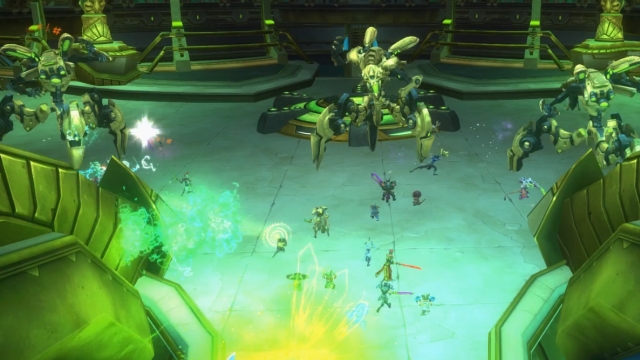In theory, the interview is the moment when you find out if the potential guild member with a cool application is actually cool or not. In practice, it frequently devolves into one of two possible situations. The first option is the Interview-In-Name-Only:
Interviewer: So… you want to join the guild.
Interviewee: Yep.
Interviewer: Uh… do you shout ethnic slurs in chat?
Interviewee: No?
Interviewer: Cool. Any questions? I’ll invite you now.
The second option is the Interview-to-the-Satisfaction-of-a-Prosecuting-Attorney:
Interviewer: Explain to me in thirty seconds why you should be allowed in this guild without using a synonym for “good.”
Interviewee: …what?
Interviewer: WHERE WERE YOU THE NIGHT OF DECEMBER 14th?!
Interviewee: I… don’t remember?
Interviewer: Don’t play games with me!
The point here is that both of these techniques are terrible. They tell you nothing, and they tell your prospective new guild member nothing, aside from the fact that you’re lackadaisical or something of a control freak. You want your interview to be useful, and these techniques produce the exact opposite.
So what can you do to have better interviews? It’s a solid question, and fortunately, one that’s easy to answer if not always easy to implement.

Time yourself
This seems really silly, but before you hold an interview, try to have some idea of how long you want it to take. Personally, I find half an hour to be about the right length of time. Sit down with a timer and an existing member of your guild, and hold a mock-interview in which you’re timing everything you ask, the other person’s responses, and all the information you need to provide.
It sounds silly, but it’s actually more useful than you might think, starting with the fact that it gives you reason and opportunity to practice being brief while still being informative. It trains you not to spend too much time talking flatly and more time interacting with the interviewee, and it gets you focused on what you can do to wrap things up in a timely manner. Without a script and with nothing but conversational cues, you can work on getting the information you need there and accessible quickly.
Wait, you have a script? Yeah, about that…
Don’t have a script
I know, I just mentioned timing yourself. You should be timing yourself. But you shouldn’t be timing how quickly you can run through a script. Scripted questions are terrible. They come across as fake, and they tell you virtually nothing about the person in question.
The best job interviews I’ve had haven’t involved any sort of script, and that’s actually been a net positive for them. Most of the interviews I have these days don’t involve scripted questions. Scripted questions are useful when your applicants may or may not have the minimum required skill necessary to stand in front of a register and say “yes” or “no” to questions; they’re not useful when you’re trying to establish a human relationship.
Anyone who managed to find your guild site and submit an application is at least competent enough to know what they’re trying to accomplish. Someone applying to your progression group in World of Warcraft would have bounced off of the application if they didn’t know what that was about. So don’t go into the interview thinking that this is a pass-fail state; go in expecting to learn about the applicant.
On that note…

Have a checklist, just the same
Raids are three times per week at an hour and a half each. Repair bills are fronted by the guild. No discussion of Star Wars comics is permitted in chat. These may all be important things to know, but putting these things as scripted questions or statements isn’t very helpful, and frankly should be available on your website rather than just stated in an interview.
A far better option for stuff that needs to be communicated and/or checked on is, in fact, a checklist. While you’re holding the interview, just run down and make sure you’re hitting all of the major points, things like conduct and the best ways to contact the applicant. Ideally, you can work it smoothly into the conversation, but that’s a skill that takes time to develop. Start off by just making sure that you have those matters address.
You’ve probably noticed that I keep referring to this as if it’s less of an interview and more of a conversation. That’s by design.
Interviews should feel like friendly chats
Obviously, an interview for a guild is not the same as an old friend just checking in to see how you’re doing. But the closer you get to the tenor of that sort of conversation, the better the interview will go.
An interview isn’t really about communicating information or learning new facts about your applicant. You can get all of that simply by putting another field on the application. Interviews are a terrible way of finding out hard data. In theory, when you’re on to the interview step, you already have all of the information you need, but you don’t yet have a clear picture of who the applicant is.
Your goal during an interview is to have the other person open up and also make it clear what sort of environment they can expect from the guild. Obviously, there’s a bit of feeling out of facts – if the person claimed to have an insanely high win ratio in League of Legends but then starts talking about all of the cheats they use to ensure they win, that’s worth finding out now rather than later. But a lot of it comes down to culture and understanding who the interviewee will be working with.
Tell jokes that you would expect to see in your usual nightly guild chat. Ask questions about things like movies and music and the like. Ask about the applicant’s age and home life – a married woman with two children who works as a partner in a law firm is going to bring a very different perspective to a group of unattached twentysomethings farting around post-college. You want to use the interview to make sure that you all mesh, and that there’s enough space to figure that out.
And last but not least…

Don’t be afraid to say no (or be told no)
Interviews are the last stage before letting an applicant into your group in pretty much every case. It’s right before the end-zone dance. But there’s a tendency, as such, to think of the interview as a formality. You’re going to let the applicant in no matter what, this is just the part that you have to do before you let them in.
If that’s how you’re running things, as interviewer or applicant, you’re doing it wrong. The interview is your chance to stop things from going south on both sides.
When you’re holding the interview, you’re in a position of figuring out at the end whether or not this person is someone who will actually enhance your guild at all. If you have a bad feeling about the applicant, you’re well within your rights to say that the applicant should not join your group. There are people who can meet all of your numerical criteria but still be a terrible fit.
Similarly, if you’re applying and get a bad vibe from the interview, you can back out. You can say that you’ve changed your mind. Odds are low that the interviewer is in no way representative of the guild as a whole; more likely than not, the interviewer is an officer and a respected part of operation. If you think “this is not someone I want to work with,” you should walk away from the interview and the guild politely.
When handled right, an interview serves to let both the interviewer and interviewee know what they’re getting involved with. It’s not about just asking questions and getting answers, but about learning who these people are. Consider that before your next interview to be sure you’re making the most of the opportunity.







Published: Feb 16, 2016 08:20 am